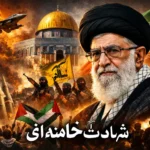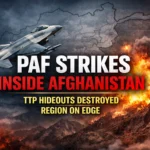In a dramatic move that has shaken the global security landscape, U.S. President Donald Trump has fired Lt. Gen. Jeffrey Kruse, the head of the Defense Intelligence Agency (DIA). The dismissal followed a leaked intelligence report revealing that June’s U.S. strikes on Iran’s nuclear sites only delayed—rather than destroyed—Tehran’s nuclear program.
This unprecedented firing has exposed deep divisions between U.S. intelligence professionals and the Trump administration’s public narrative of a “total victory” over Iran.
2. Iran’s Nuclear Resilience: Tehran Defies U.S. and Israel
Despite the large-scale U.S. operation—Operation Midnight Hammer—involving stealth bombers, Tomahawk missiles, and bunker-buster bombs, Iran’s nuclear infrastructure has remained operational. Intelligence assessments confirm Iran’s rapid recovery and continued uranium enrichment capability, positioning Tehran as the only Middle Eastern power openly resisting Israeli and American military pressure.
- Key Nuclear Sites Targeted in June 2025:
- Fordow Uranium Enrichment Plant
- Natanz Nuclear Facility
- Isfahan Nuclear Technology Center
Iran’s swift retaliation, including a missile strike on Al Udeid Air Base in Qatar, reinforced its reputation as a regional power capable of hitting back against U.S. forces and Israeli targets.
3. Politicization of Intelligence: A Dangerous Trend
Kruse’s ousting highlights the politicization of intelligence in Washington, with analysts warning that ignoring ground realities could lead to strategic miscalculations. Trump’s administration appears intent on projecting military dominance, even as internal reports contradict claims of “obliterating” Iran’s nuclear program.
This move has drawn criticism from security experts who argue that manipulating intelligence for political optics undermines U.S. credibility and fuels instability.
4. Israel’s Shadow War Against Iran Intensifies
The U.S. strikes followed Israel’s initial air assault on Iran’s nuclear facilities, which triggered a dangerous escalation cycle. Israel’s pressure on Washington to adopt a more aggressive stance has tied U.S. strategy directly to Israeli security interests.
- Impact of Israeli Actions:
- Strengthened Iran’s anti-Israel narrative across the Muslim world.
- Deepened polarization among Arab states, forcing them to choose between alignment with Israel or neutrality.
- Positioned Tehran as the symbol of defiance against Western intervention.
5. Middle East Power Balance: A Shifting Equation
Rather than crippling Tehran, these strikes may have accelerated Iran’s rise as a regional superpower. Iran’s proxy network—spanning Iraq, Syria, Lebanon, and Yemen—continues to challenge U.S. and Israeli influence.
China and Russia’s quiet support for Iran is also reshaping the Middle East into a multipolar battleground, eroding U.S. dominance.
6. U.S. Strategic Dilemma: What Comes Next?
Washington now faces a critical decision point:
- Escalate with further strikes, risking a full-scale regional war.
- Re-enter nuclear diplomacy from a position of weakened leverage.
- Rely on proxy warfare through Israel and Gulf allies to counterbalance Iran.
Trump’s administration appears likely to double down on military support for Israel, further fueling tensions in an already unstable Middle East.
7. Iran as the Symbol of Resistance
For many across the Muslim world, Iran’s resilience has cemented its image as the only state willing to openly resist Israel and U.S. hegemony. Tehran’s narrative of strength resonates far beyond its borders, from Hezbollah in Lebanon to Houthi rebels in Yemen, creating a regional axis of resistance that challenges Washington’s vision of Middle East security.
8. Conclusion: A Dangerous Gamble by Washington
The firing of Lt. Gen. Jeffrey Kruse is more than an internal personnel dispute—it is a strategic warning sign. If U.S. leadership continues to dismiss intelligence assessments in favor of political narratives, it risks underestimating Iran’s capabilities, destabilizing the region, and strengthening anti-U.S. sentiment worldwide.
Iran’s ability to withstand U.S.-Israeli strikes, maintain nuclear capabilities, and retaliate militarily places it at the heart of a shifting power balance in the Middle East. The coming months will determine whether Washington escalates, negotiates, or finds itself outmaneuvered.









